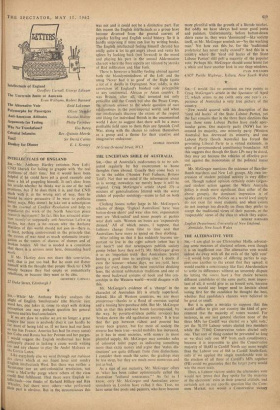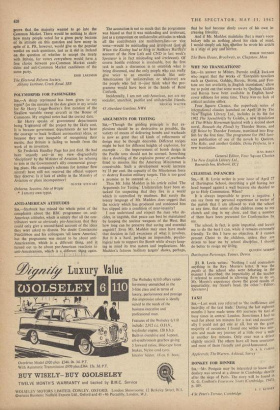THE ALTERNATIVE VOTE
StR,—I am glad to see Christopher Hollis advocat- ing some measure of electoral reform, even though it is an insufficient one. The alternative vote would indeed do away with all the evils of the 'split vote' —it would help people of differing parties to sup- port one another to the extent that they agreed; it would enable a constituency like East Aberdeenshire to settle its differences without an unseemly dispute by letting the voters have a free choice between different candidates of the same party; most impor- tant of all, it would give us an honest vote, because no one would any longer need to hesitate about voting first for the candidate he thought the best, whether that candidate's chances were believed to be great or small.
But it is quite a mistake to suppose that this would suffice to give our country the kind of gov- ernment that the majority of voters wanted. For instance, in our last general election none of the three MPs for Cardiff was elected on a 'split vote,' yet the 70,359 Labour voters elected two members while the 77,04 Conservative voters elected only one. That sort of thing cannot be prevented so long as we elect only one MP from each constituency, because it is impossible to give the Conservative majority of 10,683 in Cardiff North any more weight than the Labour one of 868 in Cardiff South-East; only if we applied the single transferable vote to the election of all three of Cardiff's MPs together (PR) could we guarantee that the larger party would win the more seats.
Thus, a Labour victory under the alternative vote would not 'prove that they spoke for the majority of the electorate' even in their general attitude, and certainly not on any specific question like the Com- mon Market, nor would a Conservative victory
prove that the majority wanted to go into the Common Market. There would be nothing to show how many people voted for a given party because of its attitude on this question and how many in spite of it. PR, however, would give us the popular verdict on such questions, just as it did in Ireland on• the question of whether to accept the treaty. with. Britain, for voters everywhere would have a free choice between pro-Common Market candi- dates and anti-Common Market candidates of the same party.
Albany Institute, Creek Road, SE8



































 Previous page
Previous page